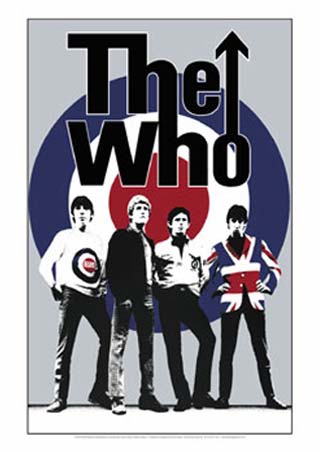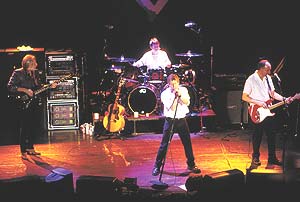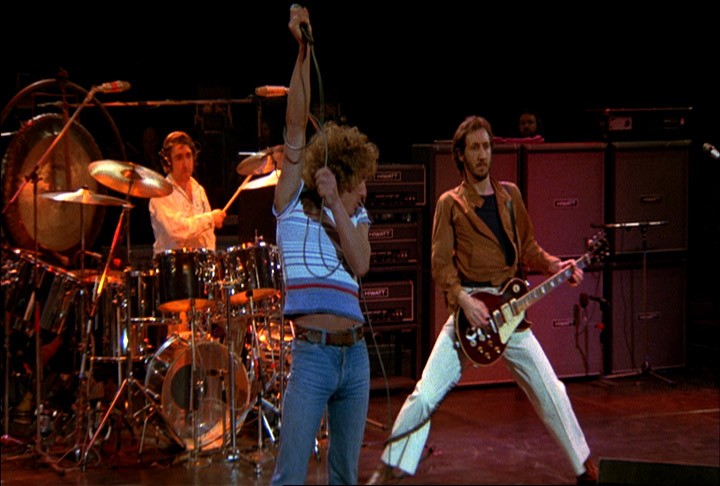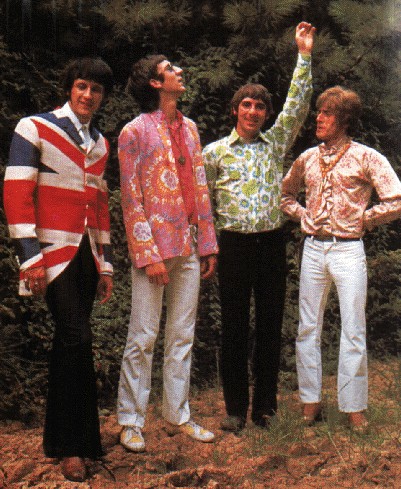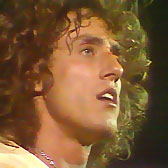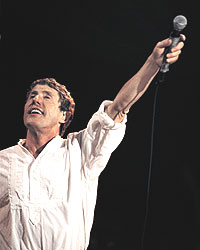|
 Formed in Shepherd's Bush, London, England in 1964, the Who evolved out of local youth club band the Detours. Pete Townshend (b. Peter Dennis Blandford Townshend, 19 May 1945, Chiswick, London, England; guitar/vocals), Roger Daltrey (b. 1 March 1944, Hammersmith, London, England; vocals) and John Entwistle (b. John Alec Entwistle, 9 October 1944, Chiswick, London, England, d. 27 June 2002, Las Vegas, Nevada, USA; bass) founded this attraction, and having jettisoned Colin Dawson (vocals) and Doug Sandom (drums), recruited Keith Moon (b. Keith John Moon, 23 August 1946, Wellesden, London, England, d. 7 September 1978, England) as a replacement for the latter. The restructured quartet was adopted by manager/publicist Peter Meadon, who changed their name to the High Numbers, dressed them in stylish clothes and determinedly courted a mod audience. Their sole single, "I'm The Face", proclaimed this allegiance although Meadon shamelessly purloined its melody from Slim Harpo's "Got Love If You Want It".
Formed in Shepherd's Bush, London, England in 1964, the Who evolved out of local youth club band the Detours. Pete Townshend (b. Peter Dennis Blandford Townshend, 19 May 1945, Chiswick, London, England; guitar/vocals), Roger Daltrey (b. 1 March 1944, Hammersmith, London, England; vocals) and John Entwistle (b. John Alec Entwistle, 9 October 1944, Chiswick, London, England, d. 27 June 2002, Las Vegas, Nevada, USA; bass) founded this attraction, and having jettisoned Colin Dawson (vocals) and Doug Sandom (drums), recruited Keith Moon (b. Keith John Moon, 23 August 1946, Wellesden, London, England, d. 7 September 1978, England) as a replacement for the latter. The restructured quartet was adopted by manager/publicist Peter Meadon, who changed their name to the High Numbers, dressed them in stylish clothes and determinedly courted a mod audience. Their sole single, "I'm The Face", proclaimed this allegiance although Meadon shamelessly purloined its melody from Slim Harpo's "Got Love If You Want It".
Two budding film directors, Kit Lambert and Chris Stamp, then assumed management responsibilities and having reverted to their Who sobriquet, the band assiduously began courting controversial publicity. Townshend's guitar pyrotechnics were especially noteworthy; the instrument was used as an object of rage as he smashed it against floors and amplifiers in simulation of painter Gustav Metzger's auto-destructive art, although the origins of the act derived from when Townshend accidentally broke the neck of his guitar in a low-ceilinged club to the perverse delight of the crowd.
The Who's in-person violence matched an anti-social attitude and despite a highly successful residency at the famed Marquee club, the Who were shunned by major labels. They eventually secured a deal through Shel Talmy, an independent producer who placed the band with American Decca Records. Their recordings were then sub-contracted through UK subsidiary, Brunswick Records, a perilous arrangement bearing later repercussions.
The Who's first single "I Can't Explain", released in January 1965, rose to the UK Top 10 on the strength of appearances on television's Ready, Steady, Go! and Top Of The Pops, the latter transpiring when another act dropped out. Written by Townshend, already the band's established composer, but modelled on the Kinks, the song's formal nature surprised those expecting a more explosive performance. Such hopes were answered by the innovative "Anyway, Anyhow, Anywhere" and "My Generation", the latter of which encapsulated the frustrations of an amphetamine-charged adolescent, both in its stuttered intonation and smash-and-grab instrumental section. This pivotal release, one of the benchmarks of British 60s pop served as the title track to the Who's debut album, the release of which was delayed to accommodate new Townshend originals at the expense of now passé cover versions. "The Kids Are Alright" and "Out In The Street" articulated a sense of cultural affinity and if the songwriter's attachment to the mod phenomenon was undoubtedly expedient, the cult held a lasting fascination for him.
Despite artistic and commercial success, the Who wished to sever their punitive contract with Talmy. When he refused to renegotiate their terms of contract, the band simply refused to honour it, completing a fourth single, "Substitute", for a new label and production company. The ensuing wrangle was settled out of court, but although the unit achieved their freedom, Talmy retained five percent royalty rights on all recordings made until the end of the decade. The Who continued to enjoy chart success, adeptly switching subject matter from a parochial clique to eccentric characterizations involving transvestism ("I'm A Boy"). Townshend's decidedly English perceptions initially precluded a sustained international success. A Quick One and The Who Sell Out, the latter of which was, in part, programmed as a homage to pirate radio, thus proved more acceptable to the UK audience.
The Who's popularity in the USA flourished only in the wake of their strong set at the 1967 Monterey Pop Festival. They returned to the UK Top 10 in the winter of 1967 with the powerful "I Can See For Miles". Despite their strength as a singles act, however, the band failed to achieve a number 1 hit on either side of the Atlantic.
They embraced the album market fully in 1969 with Tommy, an extravagant, semi-autobiographical rock opera which became a staple part of their increasingly in-demand live appearances. The set spawned a major hit in "Pinball Wizard" but, more crucially, established the band as a serious act courting critical respectability. Tommy was later the subject of a film, directed in 1975 by the suitably eccentric Ken Russell, as well as an orchestrated interpretation, recorded in 1972 under the aegis of impresario Lou Reizner. This over-exposure undermined the power of the original, and fixed a musical albatross around its creator's neck.
The propulsive Live At Leeds, released in 1970, was a sturdy concert souvenir (regarded by many as one the best live albums ever recorded), while Townshend created his next project, Lighthouse, but this ambitious work was later aborted, with several of its songs incorporated into the magnificent classic Who's Next. Here the Who asserted their position as one of rock's leading attractions by producing an album that contained "Baba O'Riley" and "Won't Get Fooled Again", two epic anthems destined to form an integral part of the band's 70s lexicon. The latter reached the UK Top 10 and was the prelude to a series of specifically created singles - "Let's See Action" (1971), "Join Together" (1972), "Relay" (1973) - which marked time as Townshend completed work on Quadrophenia.
This complex concept album was a homage to the mod sub-culture which provided the artist with his first inspiration. Although compared unfavourably with Tommy, the set's plot and musical content, while stylistically the antithesis of the band's early outburst, has shown a greater longevity and was the subject of a commercially successful film, featuring future stars Toyah and Sting.
Commitments to solo careers undermined the parent unit's progress during the mid-70s, and 1975's The Who By Numbers, although a relevant study of the ageing rock star, was deemed low-key in comparison with earlier efforts. Another hiatus ensued, during which the ever self-critical Townshend reassessed his progress in the light of punk. The quartet re-emerged with the confident Who Are You, but its release was sadly overshadowed when, on 7 September 1978, Keith Moon died following an overdose of his Heminevrin medication taken to alleviate alcohol addiction. His madcap behaviour and idiosyncratic, exciting drumming had been an integral part of the Who fabric and rumours of a permanent split abounded. A retrospective film, The Kids Are Alright, enhanced a sense of finality, but the band resumed recording in 1979 having added former Small Faces/Faces drummer Kenney Jones (b. 16 September 1948, Stepney, London, England) to the line-up.
However, any new-found optimism was undermined that year when 11 fans were killed prior to a concert at the Cincinnati Riverfront Colosseum in Ohio during a rush to secure prime vantage points, and neither Face Dances nor It's Hard recaptured previous artistic heights, although the former contained the fiery "You Better You Bet", which restored them to the UK Top 10.
A farewell tour was undertaken in 1982-83 and although the band did reunite for an appearance at Live Aid, they remained estranged until the end of the decade. Townshend's reluctance to tour - he now suffered from tinnitus - and his much-publicized period of heroin addiction, were major stumbling blocks, but in 1989 he agreed to undertake a series of US dates to celebrate the Who's 25th anniversary (with Simon Phillips on drums). Townshend, Daltrey and Entwistle were augmented by a large ensemble of supporting musicians for a set indebted to nostalgia, which culminated in Hollywood with an all-star gala rendition of Tommy. As such, the tour confirmed the guitarist's fears - a request to include material from his concurrent solo album The Iron Man was vetoed. Townshend's desire to progress and challenge preconceptions has marked the very best of the Who's extensive and timeless catalogue.
In 1993, over 25 years after its original release as an album, a production of Tommy, retitled The Who's Tommy, was staged on Broadway, and won five Tony Awards. The Who's star continued to rise in 1994 with the sympathetically packaged Thirty Years Of Maximum R&B CD box set, and was maintained with the reissued Live At Leeds with many extra tracks added from that memorable gig. The recording recalled a period that showed Townshend's playing at its most fluid and Daltrey's vocals strong and effortless. Further reissues in the mid-90s included The Who Sell Out, Who's Next and A Quick One, all of which were expertly remastered and contained many extra tracks, including the legendary Ready Steady Who EP. From these albums it is clear from where 90s Britpop bands such as Dodgy, Blur, and Swervedriver derived their "Cockney' rock style. Released three decades too late for most Who fans, 1996"s Live At The Isle Of Wight Festival set demonstrated (as does Live At Leeds) what an astonishing live band the Who were (and are). The quality of the Isle Of Wight concert recording was viewed as a welcome windfall to the band's (still) considerable following.
In June 1996 the Who appeared at London's Hyde Park, performing Quadrophenia in front of 200,000 people.
Further performances were given in the USA and the UK later that year. The drummer for this latest re-formation was Zak Starkey (b. 13 September 1965, London, England), son of Ringo Starr. The Who's major tour in 2000 (with Starkey and John "Rabbit" Bundrick) was remarkable. Keith Moon would have been proud of the younger Starkey's uncanny ability to "play in the style of". Townshend appeared to enjoy playing onstage and relations on and off stage with Daltrey were highly amiable. The music at most concerts was stunning, and belied the ages of the three senior members. The Who are unquestionably one of the finest acts of the rock generation, and they continued, up until Entwistle's death in June 2002, to be one of the most influential and exciting (Townshend and Daltrey soldiered on and completed a number of subsequent live dates with Pino Paladino filling in on bass). Alongside the Rolling Stones they continue to be spoken of as the greatest rock 'n' roll band in the world.
DISCOGRAPHY: My Generation (Brunswick 1965)****, Sings My Generation (Decca 1966)****, A Quick One (Reaction 1966)****, The Who Sell Out (Track 1967)****, Happy Jack (Decca 1967)***, Magic Bus - The Who On Tour (Decca 1968)***, Tommy (Track 1969)****, Live At Leeds (Track 1970)*****, Who's Next (Track 1971)*****, Quadrophenia (MCA 1973)****, The Who By Numbers (Polydor 1975)***, Who Are You (Polydor 1978)**, The Kids Are Alright film soundtrack (Polydor 1979)***, Quadrophenia film soundtrack (Polydor 1979)****, Face Dances (Polydor 1981)**, It's Hard (Polydor 1982)**, Join Together (Virgin 1990)***, Live At The Isle Of Wight Festival 1970 (Essential 1996)****, Live At Leeds Deluxe Edition (Polydor 2001)*****, My Generation Deluxe Edition (Polydor 2002)*****, Who's Next Deluxe Edition (Polydor 2003)*****, Live At The Royal Albert Hall (SPV 2003)***, Tommy: The Deluxe Edition (Polydor 2004)****.
COMPILATIONS: Magic Bus (Decca 1967)***, Direct Hits (Decca 1968)***, Meaty, Beaty, Big & Bouncy (Polydor 1971)*****, Odds & Sods (Track 1974)****, The Story Of The Who (Polydor 1976)***, Hooligans (MCA 1981)***, Rarities Volume 1 (1966-1968) (Polydor 1983)***, Rarities Volume 2 (1970-1973) (Polydor 1983)***, The Singles (Polydor 1984)***, Who's Last (MCA 1984)**, Who's Missing (MCA 1985)**, Who's Better Who's Best (Polydor 1988)****, The Who Collection (Stylus 1988)***, Thirty Years Of Maximum R&B 4-CD box set (Polydor 1994)*****, My Generation - The Very Best Of The Who (Polydor 1996)*****, BBC Sessions (Polydor 2000)****, The Ultimate Collection (Universal Music TV 2002)*****, The 1st Singles Box (Polydor 2004)****, Then And Now! (Polydor 2004)****.
VIDEOGRAPHY: The Kids Are Alright (PolyGram Music Video 1984), Thirty Years Of Maximum R&B Live (PolyGram Music Video 1994), Live At The Isle Of Wight Festival 1970 (Warner Music Vision 1996), Live, Featuring The Rock Opera Tommy (Sony Music Video 1996), Classic Albums: Who's Next (Eagle Rock 1999), The Who & Special Guests Live At The Royal Albert Hall (Aviva International 2001), The Vegas Job: The Who Reunion Concert Live In Vegas (Direct Video Distribution 2003), Live In Boston (Warner Music Vision 2004).
BIBLIOGRAPHY: The Who, Gary Herman. The Who, Jeff Stein and Chris Johnston. Les Who, Sacha Reins. The Who ... Through The Eyes Of Pete Townshend, Connor McKnight and Caroline Silver. The Who, George Tremlett. The Who: Ten Great Years, Cindy Ehrlich. The Who Generation, Nik Cohn. A Decade Of The Who: An Authorized History In Music, Paintings, Words And Photo, Steve Turner. The Story Of Tommy, Richard Barnes and Pete Townshend. Whose Who? A Who Retrospective, Brian Ashley and Steve Monnery. Keith Moon: The Life And Death Of A Rock Legend, Ivan Waterman. The Who: Britain's Greatest Rock Group, John Swenson. The Who File, Pearce Marchbank. Quadrophenia, Alan Fletcher. The Who In Their Own Words, Steve Clarke. Mods!, Richard Barnes. The Who, Paul Sahner and Thomas Veszelits. The Who, Giacomo Mazzone. The Who: An Illustrated Discography, Ed Hanel. Moon The Loon: The Amazing Rock And Roll Life Of Keith Moon, Late Of The Who, Dougal Butler with Chris Trengove and Peter Lawrence. The Who: The Illustrated Biography, Chris Charlesworth. Full Moon: The Amazing Rock & Roll Life Of Keith Moon, Late Of The Who, Dougal Butler. The Who Maximum R & B: An Illustrated Biography, Richard Barnes. Before I Get Old: The Story Of The Who, Dave Marsh. The Who: The Farewell Tour, Philip Kamin and Peter Goddard.
The Complete Guide To The Music Of ..., Chris Charlesworth. The Who In Sweden, Ollie Lunden (ed.). The Who Concert File, Joe McMichael and Irish Jack Lyones. Dear Boy: The Life Of Keith Moon, Tony Fletcher. A Fortnight Of Furore: The Who And The Small Faces Down Under, Andrew Neill. Meaty, Beaty, Big And Bouncy, John Perry. The Who On Record: A Critical History 1963-1998, John Atkins. Eyewitness The Who, Johnny Black. Anyway Anyhow Anywhere: The Complete Chronicles Of The Who 1958-1978, Andy Neill and Matt Kent. The Who: A Who's Who, Richard Bogovich with Cheryl Posner.
FILMOGRAPHY: Tommy (1975), The Kids Are Alright (1978), Quadrophenia (1979).
|
